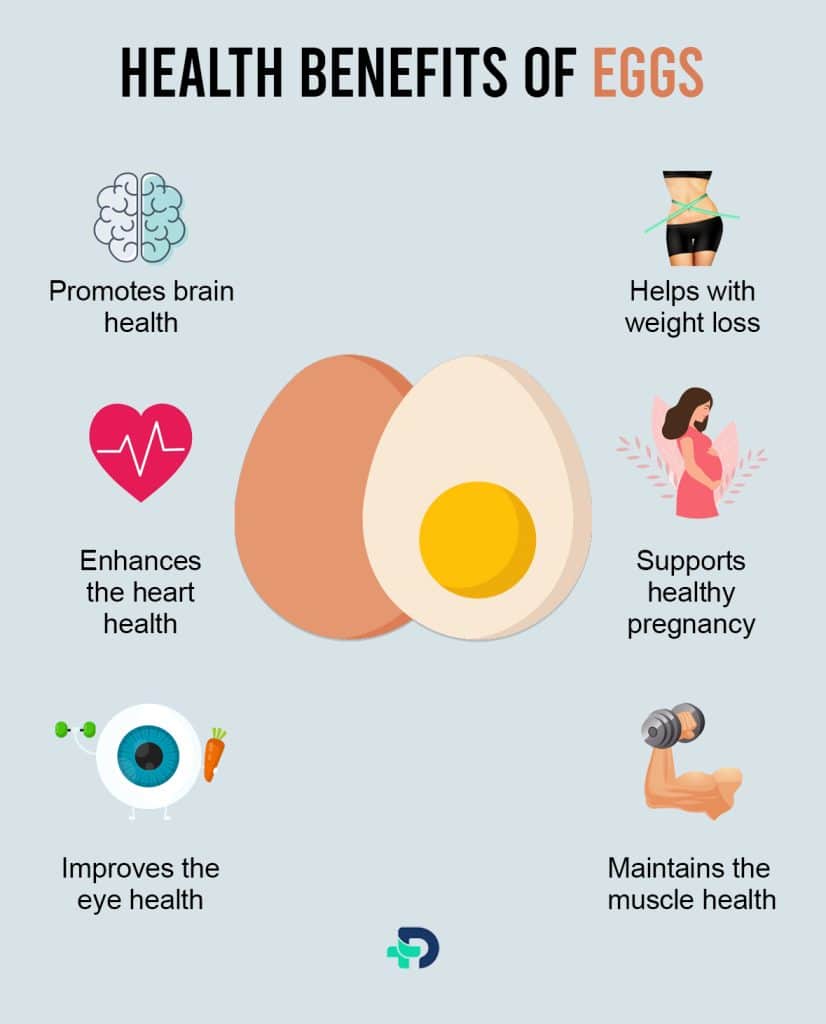Unveiling the Health Benefits of Eggs

- Eggs
- 22 Aug 2023
Overview
About Eggs
Chicken Eggs are the most common and versatile food in every kitchen. Eggs are one of the most delicious and nutritious foods containing protein, vitamins, and minerals.
It is also rich in cholesterol, which creates a dilemma in some people’s minds as a healthy option. However, some amount of cholesterol is good for our health. Hence it is vital to know how much to include in our daily diet.1Overview| Researched based study from Sciencedirect.com
The article will summarize eggs and their nutrition, potential health benefits, consumption portion sizes, and risk and safety options.

Nutrition
Nutrition in Eggs
A boiled egg contains the following nutrients:
- Calories-78
- Protein-6 gm (gram)
- Fat-5 gm
- Cholesterol-162 mg
- Vitamin A-8% of daily value (%DV)
- Vitamin B12-23% of DV
- Vitamin B5 (Pantothenic acid)-14% of DV
- Vitamin B2 (Riboflavin)-20% of DV
- Selenium- 28% of DV
- Phosphorus-7% of DV 2Nutrition| Researched based study from Usda.gov
Other vitamins and minerals
- Vitamin E
- Vitamin D
- Vitamin K
- Vitamin B6
- Vitamin B9
- Magnesium
- Potassium
- Sodium
- Calcium
- Zinc
- Iron
Besides this, eggs also contain omega-3 fatty acids and antioxidants viz; lutein and zeaxanthin.
Omega-3 fatty acids, vitamins, and minerals have the following function in our body:
Omega-3 fatty acid
- Omega-3 fatty acids are suitable for the heart health
- It also helps in proper vision and brain functioning
Vitamin A
- It is crucial for vision, growth, and reproduction
- It maintains the immune system of the body
Vitamin B12
- B12 helps maintain the blood and nerve cells of the body
- It keeps the bone healthy
Vitamin B5 (Pantothenic acid)
- Vitamin B5 helps in the conversion of food to energy
- It is vital for making blood cells
Vitamin B2 (Riboflavin)
- It enables the body to convert food into energy
- It is essential for the body’s growth
Selenium
- It helps in proper thyroid and reproductive function
- It protects the body against cell destruction
Phosphorus
- Phosphorus is necessary for healthy bones and teeth
- It helps activate several enzymes and maintains the normal blood pH
Vitamin E
- Vitamin E maintains skin and eye health
- It protects the body against infections
Vitamin D
- Vitamin D supports the immune system
- It helps keep the bone health
Vitamin K
- Vitamin K is for the healing (blood clotting) process in our body
- It promotes the bone health
Vitamin B6 (Pyridoxine)
- Vitamin B6 is crucial for proper brain functioning
- It keeps the immune system and nervous systems healthy
Vitamin B9 (Folate)
- It helps in the production of white and red blood cells
- It helps in usual tissue growth and cell execution
Magnesium
- It supports the muscles and nerve functions
- Magnesium also maintains the normal bone health
Potassium
- Potassium is crucial for correct nerve and muscle functioning
- It is indispensable for regulating the blood pressure in our body
Sodium
- Sodium helps in proper nerve and muscle function
- It helps maintain the body’s blood pressure
Calcium
- It promotes healthy bones and teeth
- Calcium helps in regulating normal heart and nerve function
Zinc
- Zinc helps in cell development, cell division, sore healing, and carbohydrate breakdown.
- It helps the immune system work properly
Iron
- It helps in the growth and development
- Iron helps to make hemoglobin, a red blood cell protein necessary to transport oxygen from the lungs to tissues 2Nutrition| Researched based study from Usda.gov
Health benefits

Health benefits of Eggs
Eggs have the following health benefits:
- Promotes brain health
- Enhances the heart health
- Maintains the muscle health
- Improves the eye health
- Helps with weight loss
- Supports healthy pregnancy
Promotes brain health
- Eggs contain choline which plays an essential role in proper brain functioning.
- It enhances the thinking ability 3Health Benefits| Researched based study from Nih.gov
Enhances the heart health
- Nutrients in eggs increase the level of the body’s high-density lipoprotein (good cholesterol)
- It reduces the risk of heart diseases 4Health Benefits| Researched based study from Nlm.nih.gov
Maintains the muscle health
- Nutrients in egg help repair the body’s tissues
- It helps in muscle growth 5Health Benefits| Researched based study from Sciencedirect.com
Improves the eye health
- Nutrients in eggs viz; lutein and zeaxanthin prevent age-related macular degeneration (eye disease)
- It maintains the eye’s vision 6Health Benefits| Researched based study from Sciencedirect.com
Helps with weight loss
- Nutrients in eggs keep the stomach full for long periods
- It lowers hunger and thus helps reduce weight7Health Benefits| Researched based study from Sciencedirect.com
Supports healthy pregnancy
- Nutrients in egg help promote the baby’s bone and teeth and overall baby’s growth during pregnancy.
- It prevents congenital anomalies in the baby 8Health Benefits| Researched based study from Nlm.nih.gov
Diet recommendation
- Most people without health issues such as stroke or a heart attack can consume one egg daily.
- People with health conditions can consume up to three full eggs in one week (7 days). People who want to take more than the suggested amount should take only the egg white, i.e., the protein part, and avoid the yolk portion to reduce the cholesterol intake.
- People usually consume eggs and other foods, so one should be alert about the cholesterol in other side foods and adjust intake to maintain a balanced diet.
Risks
Risks of having Eggs
Egg Allergy
Most people can tolerate eggs well when consumed in moderation. However, some people with egg allergy might experience the following symptoms:
- Hives
- Itching
- Skin rash
- Swelling in the face, mouth, lips and tongue
- Abdominal pain
- Difficult breathing
Contamination
- Raw eggs have the risk of containing harmful bacteria, viz; salmonella, that can enter the egg through the shell pores. Salmonella bacteria can cause food poisoning in humans. In the United States, the USDA (The United States Department of Agriculture) graded eggs are sanitized before sale to reduce the food-borne disease risk.
Cholesterol
- Egg cholesterol may not impact most healthy individuals when consumed in moderation. However, it could increase slightly in people with heart issues such as hypertension and diabetes. Such individuals must consult a doctor for the egg’s exact amount daily or weekly 9Risks| Researched based study from Academic.oup.com
Tips to avoid risk
- Cook the eggs until the whites are nontransparent, and the yolks are hard to touch
- Avoid buying eggs with cracked shells or whose expiry dates have passed
- Always keep eggs in the fridge. Avoid storing eggs at room temperature, as egg sweating can favor the growth of harmful Salmonella bacteria in the shell. In the United States, people pasteurize the eggs, which involve swift heating and keeping them at elevated temperatures to destroy the Salmonella bacteria.
Food Safety
- Bacteria in the raw eggs might carry harmful bacteria. So refrigeration and thorough cooking is a must to avoid potential risk 11Risks| Researched based study from Sciencedirect.com .
Tips
Tips to Buy & Preparing Eggs
Buying Eggs
- Two types of eggs are available in the market: eggs of caged hens and eggs of free-range hens.
- Caged hens have limited movement in everyday activities, while free-range hens can move around and have unlimited food and water.
- Caged hens are more prone to infections from flies and bacteria than free-range hens. Moreover, free-range hens’ eggs have more vitamins and minerals when compared to caged hens.
- So, one must always prefer to buy eggs of free-range hens to get the utmost safety and the most nutritional benefits 10Tips| Researched based study from Sciencedirect.com
Egg preparation
- Prepare the boiled egg by putting the thoroughly washed raw egg in boiling water for around 10 to 15 minutes. After 15 minutes, remove the cooked egg from the pan, discard the hard outer white covering with your fingers, and wash again in water. Sprinkle some salt and pepper, and enjoy.
- To prepare the omelet, put some oil in the pan, then pour the egg mixture containing salt and pepper into the pan and spread it to make a circle. When it appears cooked, fold it, remove it from the pan, and serve.
Tips to include eggs in the diet
- Include hard-boiled egg along with other breakfast cereal in the morning
- Put fried eggs into your favorite sandwich
- Put boiled eggs in different types of salads for a great taste
- Put a poached egg on bread toast for a healthy start to the day
- Put scramble eggs into green veggies to make them more nutritious
Tips on cooking safely
- Cook omelets until the disappearance of the liquid part of the egg
- Cook poached and fried eggs until the yolks thicken and the white part settles
- Cook food with eggs at a temperature of 160 degrees Fahrenheit
Storage
Storage
How to store eggs?
- One can store eggs in the fridge at around 40 degrees Fahrenheit.
- Eggs remain in good quality in the fridge for up to 21 days from the day of buying.
- One can keep the hard-boiled eggs in the refrigerator for up to seven days
Alternatives
Egg alternatives
- Some people on a vegan diet do not eat eggs. A good alternative is available for those people, known as vegan eggs.
- Vegan eggs are plant-based products that mix protein powder, legumes, soya extracts, mung, chickpeas, peas, and other plant products. The vegan egg looks like the chicken egg, and one can make similar items viz; scrambled eggs and omelets as the egg. The vegan eggs even taste identical to the hen’s eggs. People can even integrate them into numerous dishes and baked items.
- However, the nutrient composition differs from that of a hen’s eggs.
- One can buy vegan eggs online from supermarkets and health stores.
Takeaway
Key Takeaways
- Eggs are an affordable, nutritious food with many health benefits
- Eggs are easy to prepare, and one can add them to several recipes without much effort
- Eggs are a healthy option when taken in moderation based on the individual’s needs
- It can be an excellent addition to a well-balanced diet
Any feedback on this article?
 This Articles content was accurate
This Articles content was accurate Very Informative Article
Very Informative Article I have a question or a comment
I have a question or a comment
 This article contains inaccurate content
This article contains inaccurate content This article was not helpful
This article was not helpful I have a question or a comment
I have a question or a comment
We appreciate your helpful feedback!
Checkout our social pages
References
-
Science Direct
Egg - an overview | Overview
-
U.S. DEPARTMENT OF AGRICULTURE
Egg, whole, cooked, hard-boiled | Nutrition
-
National Institutes of Health
Choline-Fact Sheet for Health Professionals | Benefits
-
National Library of Medicine
Intake of up to 3 Eggs per Day Is Associated with Changes in HDL Function and Increased Plasma Antioxidants in Healthy, Young Adults | Benefits
-
Science Direct
Egg White Protein Promotes Developmental Growth in Rodent Muscle Independently of Leucine Content | Benefits
-
Science Direct
Lutein and zeaxanthin in eye and skin health | Benefits
-
Science Direct
Whole Egg Consumption Decreases Cumulative Weight Gain in Diet-Induced Obese Rats | Benefits
-
National Library of Medicine
Egg Contribution Towards the Diet of Pregnant Latinas | Benefits
-
Oxford Academic
Egg consumption and risks of all-cause and cause-specific mortality: a dose–response meta-analysis of prospective cohort studies | Risks
-
Science Direct
Chicken Eggs - an overview | Tips
-
Science Direct
Egg quality and safety with an overview of edible coating application for egg preservation | Risks




































